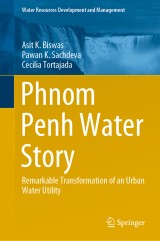Details

Phnom Penh Water Story
Remarkable Transformation of an Urban Water UtilityWater Resources Development and Management
|
CHF 77.00 |
|
| Verlag: | Springer |
| Format: | |
| Veröffentl.: | 10.12.2020 |
| ISBN/EAN: | 9789813340657 |
| Sprache: | englisch |
Dieses eBook enthält ein Wasserzeichen.
Beschreibungen
This book analyses how a water utility from a developing country, Phnom Penh Water Supply Authority, that was totally dysfunctional, corruption-ridden and literally bankrupt in 1993, became one of the most successful water utilities of the developing world in only about 15 years. By 2010, some of the performance indicators of this public sector utility were even better than London, Paris or Los Angeles. The book further analyses the enabling conditions that made this remarkable transformation possible. Based on this analysis, a framework is recommended for water utilities from developing countries so that they can also be transformed into functional, efficient, equitable and financially viable institutions on a sustainable basis.
About this book.- Understanding Cambodia.- Phnom Penh Water Supply Authority.- Four Domain (4-D) Framework for analysis of urban water utility.- Analysis of PPWSA.- Gap analysis of four domains.- Views of the customers.- Key challenges facing PPWSA.- Lessons learnt for developing countries.- A Management Tool Kit for Chief Executives.
<p><b>Asit K. Biswas</b> is one of the world’s leading authorities on water, environment and development-related issues. A distinguished academic, he has been an advisor and confidant to Presidents, Prime Ministers and Ministers in 21 countries, six Heads of United Nations Agencies, two Secretary-Generals of OECD, several Heads of bilateral aid agencies, and four CEOs or Chairmen of major MNCs. He has received numerous international awards, including Stockholm Water Prize, considered to be the Nobel Prize for water. Recipient of seven Honorary Doctorates from leading global universities, he is the author of 88 books. His work has been translated into 42 languages. </p>
<p><b>Pawan K. Sachdeva</b> is an engineer with a MBA and a Master’s degree in public policy. He has consulted and researched on the performances of water utilities in many states of India, different urban centres of Cambodia, and other Asian cities. At present he is a Non-Executive Director ofWater Management International Private Ltd. of Singapore. He has also been an Adjunct Professor to Indian Institute of Technology, Kharagpur (India).</p>
<b>Cecilia </b>Tortajada has been an advisor to major international institutions like FAO, UNDP, JICA, ADB, OECD, IDRC and GIZ, and has worked in numerous countries in Africa, Asia, North and South America, and Europe on water and natural resources management and environment policies. Winner of the prestigious Crystal Drop Award of the International Water Resources Association, she is also a member of the OECD Initiative on Water Governance and member of the International Selection Committee, Millennium Technology Prize, Technology Academy Finland. She is a past President of the International Water Resources Association and Editor‐in‐Chief of the <i>International Journal of Water Resources Development</i>. She is the author and editor of more than 40 books. A leading global authority on urban water and wastewater management, her work has been translated into seven languages.
<p><b>Pawan K. Sachdeva</b> is an engineer with a MBA and a Master’s degree in public policy. He has consulted and researched on the performances of water utilities in many states of India, different urban centres of Cambodia, and other Asian cities. At present he is a Non-Executive Director ofWater Management International Private Ltd. of Singapore. He has also been an Adjunct Professor to Indian Institute of Technology, Kharagpur (India).</p>
<b>Cecilia </b>Tortajada has been an advisor to major international institutions like FAO, UNDP, JICA, ADB, OECD, IDRC and GIZ, and has worked in numerous countries in Africa, Asia, North and South America, and Europe on water and natural resources management and environment policies. Winner of the prestigious Crystal Drop Award of the International Water Resources Association, she is also a member of the OECD Initiative on Water Governance and member of the International Selection Committee, Millennium Technology Prize, Technology Academy Finland. She is a past President of the International Water Resources Association and Editor‐in‐Chief of the <i>International Journal of Water Resources Development</i>. She is the author and editor of more than 40 books. A leading global authority on urban water and wastewater management, her work has been translated into seven languages.
This book analyses how a water utility from a developing country, Phnom Penh Water Supply Authority, that was totally dysfunctional, corruption-ridden and literally bankrupt in 1993, became one of the most successful water utilities of the developing world in only about 15 years. By 2010, some of the performance indicators of this public sector utility were even better than London, Paris or Los Angeles. The book further analyses the enabling conditions that made this remarkable transformation possible. Based on this analysis, a framework is recommended for water utilities from developing countries so that they can also be transformed into functional, efficient, equitable and financially viable institutions on a sustainable basis.
Presents a framework for water utilities of developing countries based on the example of the Phnom Penh Water Supply Authority (PPWSA) Discusses how proper policies and management can transform a utilities board from being dysfunctional to world class Written by leading experts, highlights case studies to substantiate the above
Diese Produkte könnten Sie auch interessieren:

Decision Support Systems for Risk-Based Management of Contaminated Sites

von: Antonio Marcomini, Glenn Walter Suter II, Andrea Critto

CHF 118.00

Dynamics of Mercury Pollution on Regional and Global Scales

von: Nicola Pirrone, Kathryn R. Mahaffey

CHF 177.00














